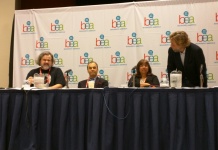 The Authors Guild is appealing Google’s November fair use win in its Google Book scanning case. The Guild says that Google is “yanking readers out of online bookstores” and stifling online bookstore competition with its digitized books.
The Authors Guild is appealing Google’s November fair use win in its Google Book scanning case. The Guild says that Google is “yanking readers out of online bookstores” and stifling online bookstore competition with its digitized books.
"Google emptied the shelves of libraries and delivered truckloads of printed books to scanning centers, where the books were converted into digital format," the Guild’s lawyers said.
They wrote that the library project was designed to lure potential book purchasers away from online retailers like Amazon.com and drive them to Google.
Wait, what?
First of all, Google doesn’t make the entire book available, except for public domain titles and titles where it has otherwise obtained permission from the publisher. It just shows enough of it to reveal why it came up in a Google Books user’s web search.
If someone wants to read the entire book, Google refers them to a bookstore—be it Amazon, Barnes & Noble, Books-a-Million, IndieBound, or others. (Or presumably themselves, but the one title I spot-checked didn’t have a sale listing from Google Play Books.) They get referral fees, the bookstore sells the book, everyone’s happy. How is that “stifling competition”? That’s helping people find a book to buy that they probably wouldn’t have even known about before!
Second, this is the same Authors Guild that blamed lax antitrust enforcement for Amazon’s domination of the online book sales market, called Amazon “anticompetitive,” and insisted that the DoJ antitrust suit against the publishers was only going to help Amazon.
Now they’re suddenly all concerned over Google’s impact on Amazon’s wellbeing? Seriously?
Do you have no shame at all, Authors Guild? None whatsoever?

































Calm down. Chris, I don’t know if you do much research, but I do. Most of the time research doesn’t mean reading an entire book. In fact, most of the time it means just grabbing what the author says on a particular topic. That impact sales in two ways:
1. I buy fewer books myself, since I can get what I want online. In the past, I bought far more books. Now I just buy a book when I’ll need all of it. That isn’t often.
2. It means that university libraries have less incentive to buy books since they can assume, “Oh, they’ll just get it through Google.” And about the only thing keeping the publication of many academic texts alive is their (in the past) sales to university libraries. Cut back radically on that and those books may not even be published to be copied–while still in copyright–by Amazon.
I’d also like to point out that your understanding of copyright law is severely defective. Copyright law isn’t just about sales and making money. Copyright is about an author controlling the copying of what he’s written. It includes the right to keep something from ever being published. And it includes the right to limit something an author once wrote that he now disagrees with or finds embarrassing to the largest extent possible. And one way of limiting is preventing Google-like mass distribution.
And if you’d read what Google has actually said and tried to do, you’d know that when this dispute began, Google regarded books that were out-of-print, and thus not available in any way that would pay the author, as a particularly ripe target for Google Books. The philosophy was that any author who had the misfortune to write a book that’d gone out of print had no right to keep Google from distributing copies willy nilly without even asking permission. What Google wanted was the very opposite of copyright. It wanted a readers right to get a copy of anything every published, often free and contrary to the wishes of the author.
It’s only as this dispute has progressed that Google has been pushed back and adopted various fall-back positions. It’s original goal was to post online every book on the planet, from every author and in every country unless that author took positive steps to stop them (opt out rather than opt in). For Japan, ‘informing’ authors of that scheme meant one (as in one) ad in a single trade publication and one (as in one) ad in a single daily newspaper. The result of not responding to that was that any of these authors around the world would find their books available to anyone coming from a U.S. IP address.
Note too that, being a U.S. court decision, Google’s settlement would only apply to those in the U.S. Journalists who called it a world library were stupidly ill-informed, as they often are. A U.S. friend of mind who is a linguist, sees that regularly. When he wants to give a colleague in Finland a copy of pages from Google Books, he has to send him a screen dump. That book isn’t available in Finland. Google.
The entire affair is extremely complex and isn’t help by the fact that the incredibly lazy, sloppy, stupid tech press has for years done little more than echo Google’s FAQs and press releases on this.
I was one of seven authors whose request to the court delayed and ultimately killed the original Google Book Settlement. Shortly afterward, I was contacted by one of the leading technical experts in New Zealand on epublishing. This was just a few weeks before the settlement would have gone into effect and, because he’d been depending on the US tech press to keep him informed, he’d only just discovered that New Zealand authors were to have their works in Google’s database without their knowledge or consent. He moved quickly and NZ apparently acted quickly and firmly enough, that the second attempt at a settlement, one that radically cut back the number of countries whose authors could be included didn’t include NZ.
That’s the current situation. It’s a bit like Obamacare, which was carefully crafted to please all the powerful special interest groups, while ignoring the public. Bit by bit, Google’s plans have been scaled back to remove any powerful group that might protest. The original settlement was actually a perversion of class action law, so for the second run, Google removed all but a handful of countries who permit class action lawsuits. And so on and so on. Now it’s to the point where the scheme is far less grandiose, where Google is mostly attempting to escape from being charged with copyright violations. And where only the AG is laboring on, attempting to fight for authors who have never, never, never, never gotten an adequate description of what Google intends, just a lot of breathless prose and ‘won’t it be wonderful chatter.’
I’ll be blunt. This case is enormously complex, the news coverage about it has been dreadful from Day One, and much of what Google has been trying to do is a direct violation of either letter or the spirit of the Berne Convention on copyright, signed by virtually every country on earth. If you’re not willing to study this dispute in all it’s complexities and ramifications and to explore its history you really have no business publishing your opinion on this topic. You are merely adding yet another ill-informed press opinion to a topic that from the very start has been dominated by ill-informed opinion from reporters. I know. I’ve discussed this with many of them.
I might add that, as a researcher, the real problem with Google Books is that it’s an utter piece of junk. That’s partly because the system was set up by a bunch of geeks who know nothing about academic research. It’s partly because it was implemented on the cheap. The bibliographical data is filled with errors and the OCRing is often terrible but not corrected as with Gutenberg. The world would have been far better served by a smaller, more focused and better done system. And such a system would have had to move slow so slowly, it could have simply followed behind as books moved out of copyright.
Instead, what we’ve got is a system that’s poorly done but so dominates that it’ll forever be difficult to get something better started. Thanks to Google, we’ve created a poor online library that’ll haunt us for centuries rather than moving more careful and creating something of permanent value.
Sorry, to be so blunt. But I was intimately involved in this dispute in the early stages. I saw how utterly poorly the tech press has covered this issue. I grow tired of seeing that continue. The press still seems stubbornly committed to echoing Google’s talking points even though Google’s own scheme has changed considerably. It’s typical reporting. Pick a ‘good’ guy and do everything possible to make him win.
The press never really understood what Google was trying to do in the first place, so of course they don’t understand when legal issues have forced Amazon to change radically, as from copying out-of-print books with utter abandon to ‘oh, we’re just here to help authors sell their still-in-print books.’ They just keep echoing Google’s latest line, however much it changes. Heck, they don’t even seem to realize that it has changed.
–Michael W. Perry
Oops, in that last paragraph I wrote Amazon when I meant Google. I can see why that’s true. Google’s schemes have been so cut back, I pay them little attention now. It’s Amazon’s miserly royalty payments to authors, perhaps 50-100% less per copy sold than Apple pays, that has me hot under the collar now.
And alas, I face the same issue: a press that until recently gave Amazon a free pass on almost anything. One well-known writer on technical topics told me, a few years ago, of his difficulties getting the Seattle Times, Amazon’s hometown paper, to publish anything critical of Amazon.
That’s slowly changing. Even the Seattle Times will criticize Amazon from time to time now. But just how badly Amazon shortchanges authors still isn’t on the little list of acceptable stories that most reporters seem to carry around in their head. And that’s bad. Millions more dollars would pour into the threadbare pockets of authors if the company just paid the same simple and fair royalties that Apple pays.
It does seem strange that the Authors Guild would be expressing concern about anybody trying to compete with Amazon. A bigger concern would seem to be the combined impact of Amazon and Google on local stores…
Michael,
If what Google Books does would be so bad for authors and publishers could you tell me why almost all large scholarly publishers allow them to index the full text of their new publications?
On the issue of control over what get’s published and into the open, do you intend that authors who after some years regret having pubished something have the right to curb access to what they already have published? Does that extend as far as retract those books from libraries? And if not, would you like to see authors have the ability to minimize libraries’ efforts to make maximise access to what they published? Just wondering.
I always felt the Authors Guild was extremely short-sighted in their suit against Google. By going for a lump sum they were giving away the store. What they should have done, IMHO, was to ask for a royalty to be paid directly to authors for page prints or views. That would have encouraged visibility for many OP or limited availability books while paying authors a royalty. Many, if not most, of the books digitized have not been available for sale in any bookstore for decades and only available in the used book market for which authors get zero return. It seems to me authors should be up-in-arms about getting nothing for their books sold in the used book market, or perhaps get a royalty when their books are checked out of a library, as they do in Britain.
It would seem Michael is more interested in restricting access to his work rather than encouraging it. If Apple pays better than Amazon, encourage everyone to move their books to them. Oh no, wait, they hardly sell any. Amazon is the best thing that ever happened to authors. No more do they have to struggle for limited shelf space and their search engine is better than any bookstore’s.
I remember going to the nearest B&N (about 40 miles) to see how my wife’s books were doing (she had been there for a signing the week before.) I looked in their computer which said there were 3 copies left in “Growth and Development”. Knowing the book in question (a YA title) had nothing to do with G&D, I looked in YA. Nothing. I asked a staff member who looked on the computer. Yup said 3 copies. She looked in several other places. Couldn’t find the books and said I should go home and order online. !! Amazon would have gotten me the book in less than two days, cheaper, and right to my door. Better visibility and sales for the authors. Better service for readers.
P.S. Full disclosure. I’m a retired college librarian.